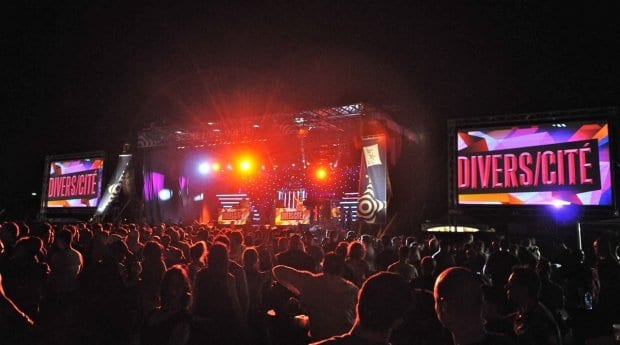Rumours are swirling that Divers/Cité, the organization behind Montreal’s original gay Pride parade and more recent queer arts festival, has called it a day after 22 years.
Divers/Cité’s phone line is dead, and co-founder Suzanne Girard has not returned Daily Xtra’s phone calls. Its website still lists its 2014 events and its copyright hasn’t been updated to 2015.
Co-founder Puelo Deir, who left Divers/Cité several years ago to run communications for several CHUM specialty television channels, thinks the organization’s slow demise began the moment it stopped organizing the Pride parade in 2006.
Founded by Girard and Deir in 1993, Divers/Cité is credited with largely putting Montreal on the international gay map in the 1990s, fueling a boom in local gay tourism, and contributing to both the development of the gay village and the local gay community. Its Pride parade and post-parade festival emerged in the aftermath of the July 1990 police raid on the gay loft party Sex Garage, which many consider Montreal’s Stonewall.
The original Divers/Cité festival mirrored the in-your-face gay militancy and politics of its organizers. In 1996, it introduced Mascara: La Nuit des Drags, an annual concert organized and hosted by soon-to-become local drag legend Mado Lamotte.
But in 2006 Divers/Cité stepped away from the Pride parade and festival to instead launch a queer arts and DJ festival. In 2012, it moved the arts festival, including its signature Mascara concert, to the Old Port of Montreal, sparking criticism that it was abandoning its gay roots in the Village.
Says Deir, “Divers/Cité suffered from a huge branding crisis. They took the soul out of the event. I believe Divers/Cité died the day they got rid of the parade.”
Fierté Montréal Pride took over the task of organizing Montreal’s annual Pride parade and LGBT Community Day in 2007.
“We knew our time in the Gay Village was coming to an end,” Girard told Daily Xtra in 2012 when she moved Divers/Cité’s queer arts festival to the Old Port. “The new [Voyageur bus terminal] entrance on Berri Street is where our [big] stage was located. So we looked at two new sites: the Old Port and Olympic Stadium. The city refused us the Quartier des Spectacles six years in a row. ‘We don’t want something like that here.’ Interpret that as you want. Personally, I think they freaked out over what they call ‘naked.’”
“Divers/Cité was the first LGBT festival in Canada to get federal funds,” notes Suzanne Girard’s brother Paul, a former marketing director for both the Quebec Major Junior Hockey League and Divers/Cité. “I’m very proud that we were the first.”
But Paul Girard — who estimates that Divers/Cité’s budget last year topped $1.6 million — acknowledges that 2014 was a make-or-break year for the organization.
“I stopped working for Divers/Cité last September,” he says. “I don’t know if the organization is gone. I have no clue. I did what I was told to do. I can’t wash my hands completely, but it is not my place to talk. The people in power don’t want me to talk.”
Deir believes the move to the Old Port led to a fatal one-two punch, especially when Lamotte quit Divers/Cité after her 2013 Mascara show.
“I pulled the plug because I was tired of it all,” Lamotte said last year. “Sixteen years is good enough. I could no longer go on doing the same show year after year.”
“Divers/Cité lost their mojo when Mado called it quits,” Deir says.
According to Deir, Girard also faced huge obstacles dealing with the city’s sexist gay establishment. “Bar owners treated Suzanne with contempt,” he claims. “During Divers/Cité’s heyday, thousands and thousands of tourists came to Montreal and spent a lot of money in the Village. That the bars then wouldn’t give money back was atrocious. They said, ‘Well, it costs a lot of money to build our terraces.’ Yes, but who was spending money to bring all those people into the Village?”
Deir says Montreal’s famed Black and Blue circuit party (founded in 1991) and Divers/Cité “were absolutely instrumental in putting Montréal on the international gay map before Tourisme Montréal got on board. Without Black and Blue and Divers/Cité there would not have been all those amazing years when the Village was booming, when hundreds of thousands of tourists came to Montreal during Divers/Cité’s heyday. Black and Blue and Divers/Cité changed this city. Tourisme Montréal had no [gay] product to sell before we arrived.”
Divers/Cité was also the first gay organization to secure financial support from several levels of government. “Getting corporate sponsors, federal and provincial money — that was unheard of for LGBT organizations,” Deir says. “Those are all things Divers/Cité did to open the doors for other organizations.”
Across town, Fierté Montréal Pride hopes the apparent death of Divers/Cité will increase its own government funding. Fierté Montréal’s 2015 budget is $1.8 million, half from in-kind sponsors and the other half cash.
“We are getting $125,000 from Quebec this year, but with Divers/Cité gone, we’ll be unhappy if we get less than $250,000 next year,” says Fierté Montréal president Eric Pineault. “That said, Suzanne Girard was a pioneer and was hugely involved with InterPride. For many years Fierté Montréal hoped to merge both festivals, but Suzanne always refused. Had I worked as hard as Suzanne to build the Divers/Cité brand, I would have refused too.”
“I hope Divers/Cité is remembered as pioneers and shit-disturbers who changed the status quo in both mainstream and alternative Montreal,” Deir says. “We were at the forefront talking about diversity, and proudly showcased the city before the whole world. So many great local, national and international artists performed at Divers/Cité over the years. We helped change the city, so I feel sad to let my baby go.”
(Disclosure: Daily Xtra reporter Richard Burnett handled media relations for Divers/Cité in its first years but resigned his seat on the Divers/Cité board in June 1996 when he began writing his syndicated LGBT column Three Dollar Bill for the Montreal alt-weekly Hour Magazine.)


 Why you can trust Xtra
Why you can trust Xtra


